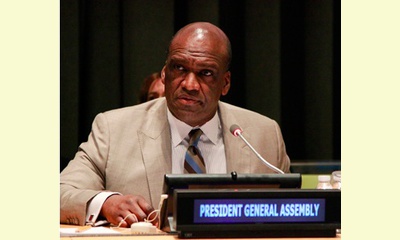|
|
UN High Level Forum on the Culture of Peace
an article by Web page of President of UN General Assembly
On 13 September 1999, the United Nations General Assembly
adopted, by consensus, Resolution 53/243 on the Declaration and
Programme of Action on a Culture of Peace. Among other things,
this Resolution provided the driving force for the implementation of
the UN-declared International Decade for Culture of Peace and
Non-Violence for the Children of the World (2001-2010). Asserting
and re-affirming the commitment of the totality of the United
Nations membership to building a Culture of Peace, the General
Assembly has been adopting resolutions on the subject every year
since 1997. 
John W. Ashe, President of the sixthy-eighth session of the General Assembly. UN Photo/Paulo Filgueiras
click on photo to enlarge
The one-day High Level Forum will take place on 9 September,
2014 at the United Nations Headquarters in New York. It will
comprise of an opening segment and two multi-stakeholder
interactive panels and a brief closing segment. The two panels will
focus on: (1) the role and contributions of women and the young to
the Culture of Peace; and (2) global citizenship as a pathway to the
Culture of Peace.
Recognizing the need for continuous support to the strengthening
of the global movement
to promote the Culture of Peace, as envisaged by the United
Nations, particularly in the
current global context, the day-long General Assembly High-level
Forum will be an
important opportunity for Member States, UN entities, civil society,
including NGO's,
media, and the private sector, and all other relevant stakeholders to
have an exchange of
ideas and proposals on ways to build and promote the Culture of
Peace, as well as to
highlight emerging trends and policies that can significantly impact
the implementation
of this Culture.
The Forum will be opened by John W. Ashe, President of the General
Assembly and Ban Ki-moon, Secretary-General of the United
Nations
Among the speakers:
Leymah Gbowee, 2011 Nobel Peace laureate
Anwarul K. Chowdhury, Former Under-Secretary-General and High
Representative of the United Nations
Lakhsmi Puri, Assistant-Secretary-General, UN Women
Ahmad Alhendawi, United Nations Envoy on Youth
Federico Mayor, Former Director-General of UNESCO
Vibeke Jensen, Director, UNESCO office in New York
The event will be broadcast live. Link available at http://webtv.un.org/
Click here to register before 4 September.
|








|
DISCUSSION
Question(s) related to this article:
What is the United Nations doing for a culture of peace?,
* * * * *
Latest reader comment:
Following the Second High Level Forum of the United Nations on the Culture of Peace, Anwarul Chowdhury, a former Under-Secretary General of the UN, had this to say about what the UN is doing for a culture of peace. His remarks were published by the Independent European Daily Express.
Civil society worldwide has been in the forefront of the global movement for the culture of peace, working diligently and patiently at the grassroots level, he said.
"I find it is the governments and power structures which are the most persistent foot-draggers with regard to advancing the culture of peace through policy steps and action," said Chowdhury, a former U.N. under-secretary-general and currently representing civil society and the Global Movement for the Culture of Peace. . .
The United Nations, he pointed out, has shown great vision by adopting its historic, norm-setting Declaration and PoA on the Culture of Peace in 1999, but has not been organised enough in making the document a system-wide flagship effort of the world body.
"I am a believer that the world, particularly the governments, will come to realise its true value and usefulness sooner than later," Chowdhury said.

|
|









